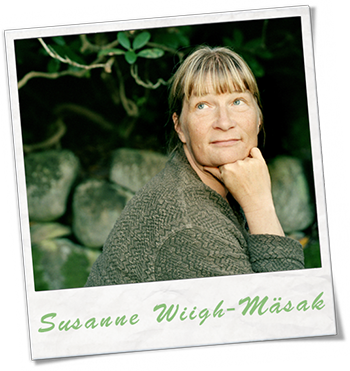 Susanne Wiigh-Mäsak pondered over her idea for an ecological form of burial for 20 years before she felt it was ready for presentation. A lot of the ecological, environmental and ethical questions fell into place. And regardless of the number of questions asked there were always answers, often provided by biological fact and ethical reasoning.
Susanne Wiigh-Mäsak pondered over her idea for an ecological form of burial for 20 years before she felt it was ready for presentation. A lot of the ecological, environmental and ethical questions fell into place. And regardless of the number of questions asked there were always answers, often provided by biological fact and ethical reasoning.
“There are many instances for which we humans do not want to accept given rules. The fact that our time on earth is limited is one of them. To be sure, it’s nice to see life as an unlimited reality, and equally nice to live it as if it were so. But imagine if life actually is that way, that we are a part of everything living and the only limit is the time we live in this body. What happens after our days have come to an end?
As far as our soul is concerned there are likely to be as many views as there are people. Deep within our most private selves, each and every one of us probably has his or her own notions. Many of the ideas and ponderings that dwell within the inner self are, however, thoughts about there being some kind of continuation of life, even after we have taken our last breath. And there is no such thing as right or wrong in these matters. It is important that every individual is allowed to have his or her faith, since no one really has access to the answers. On the other hand, we know what happens to a body that is no longer alive. Here we have answers. But despite this we don’t want to accept the given rules, instead we have devised unbiological routines concerning our last resting place. This is not a complete surprise when you consider the fact that the rules and traditions we follow for an earth burial were created in the 12th century, and haven’t changed much since that time. See separate text.
Over the past 900 years, however, we humans have gained knowledge that we should be putting into practice. Among other things not known in the 12th century, we know what oxygen is. We also know that if something is to decompose and become mulch, oxygen is required. Yet we still bury our dead at a depth absent of oxygen without considering the relationship between knowledge and tradition, and thereby subject the dead corpse to a rotting process. We have always done so. Cremation was a new way of thinking in the 19th century, emerging from the hasty urbanization of the time and the need for hygiene in the rapidly growing cities. But from a biological point of view, this is neither ecologically correct nor environmentally sound. See separate text.
My idea is to combine biological knowledge with a dignified and ethically correct way of being remembered by ones next of kin. The primary principles are preservation after death in organic form and shallow burial in living soil that quickly converts us to mulch. I am aware of the fact that this way of thinking is contrary to many customs. Yet we should try to adopt a more natural approach to our life and our death. Today’s burial traditions conceal reality from people and do not allow them to feel secure in the fact that death is essential to new life.
Deeper insights in the ecological cycle provide greater understanding of and respect for life on earth. And with the knowledge of what happens to the body after death, it is my hope that people will find greater security in their physical fate. This, in turn, can give our minds greater freedom to ponder the spiritual issues that we all carry within ourselves.”
Susanne Wiigh-Mäsak
